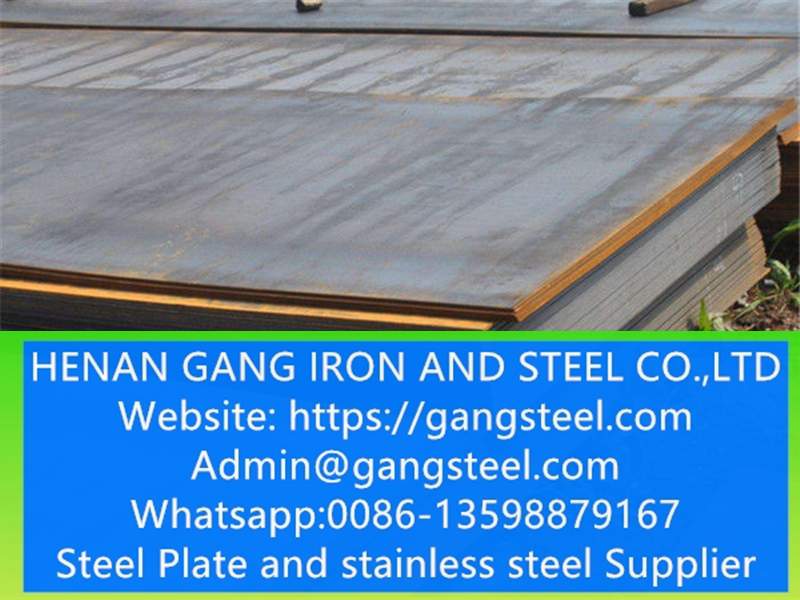en 10025-6 s690ql1
How to choose s690ql1 and A514GR.Q steel plates
Gangsteel supply EN 10025-6 S690QL1 steel plate and we also had S690QL1 stock list thickness from 5mm to 300mm.We also can provide VL, ABS, BV 3.2 certificate for ship project.
EN10025-6 S690QL1 is Alloy special steel with specified minimum values of impact energy at temperatures not lower than -60 °C.
Relate keywords: s690ql1 with vl 3.2 certificate ,s690ql1 abs 3.2 certificate ,s690ql1 steel cutting parts,s690ql1 high strength heavy thick steel plate,s690ql1 steel plate,What is en s690ql1 equivalent grade,s690ql1 material stocklist in China,CNC cutting s690ql1 steel plate,s690ql1 steel sheet factory,s690ql1 s690ql stock supplier in China,materiale s690ql1,QT s690ql1 BV approval steel plate,How to choose s690ql1 and A514GR.Q steel plates ,s690ql1 data sheet,s690ql vs s690ql1 high-strength steel,s690ql1 mechanical properties,s690ql1 Disco steel cutting parts,s690ql1 hardness,s690ql1 material equivalent,s690ql1 chemical composition,high tensile steel yield strength s690ql1,

materiale s690ql1
The Parliament House of Australia in Canberra has a chrome steel flagpole weighing over 220 metric tons . The largest stainless steel constructing in North America is the aeration building within EN10025-6 S690QL1 the Edmonton Composting Facility. La Geode in Paris has a dome composed of 6433 polished stainless-steel equilateral triangles that type the sphere that displays the sky.

Like metal, stainless steels are relatively poor conductors of electrical energy, with significantly decrease electrical conductivity than copper. In specific, the electrical contact resistance of stainless steel arises as the results of the dense protecting oxide layer, and limits its performance in purposes as electrical connectors .
What is the difference between s355jr and s355j2?
S355JR and S355J2 steel are widely used structure steel under standard EN10025-2. The different impact temperature is the main difference between S355JR and S355J2 steel. S355J2 steel can better adapt to low temperature work condition than S355JR steel.
There are over a hundred and fifty grades of stainless steel, of which 15 are most commonly used. There are a number of techniques for grading stainless and different steels, including US SAE metal grades. Unlike the above grades, the mechanical properties and creep resistance of this steel stay superb at temperatures up to seven hundred °C (1,292 °F).
As a outcome, A286 is classified as an Fe-based superalloy, used in jet engines, fuel generators, and turbo components. Grade EN 1.4303 with 13% Cr and four% Ni is used for many Pelton, Kaplan, and Francis generators in hydroelectric energy plants as a result of it has good casting properties, good weldability and good resistance to cavitation erosion. 200 collection are chromium-manganese-nickel alloys that maximize using manganese and nitrogen to attenuate using nickel. Due to their nitrogen addition, they possess roughly 50% greater yield power than 300 series stainless sheets of metal.Type 201 is hardenable via chilly working. Type 304—the most typical grade; the basic 18/8 (18% chromium, 8% nickel) stainless steel.
- Thus, there are quite a few grades of chrome steel with varying chromium and molybdenum contents to suit the environment the alloy should endure.
- The high chromium and nickel content give the metal glorious oxidation resistance in addition to high energy at excessive temperature.
- The addition of nitrogen additionally improves resistance to pitting corrosion and increases mechanical energy.
- Type S— is a extremely alloyed austenitic stainless steel used for top temperature utility.
The new standards is EN 10025-6: 2004 Hot rolled products of structural steels. Technical delivery conditions for flat products of high yield strength structural steels in the quenched and tempered condition
The old standard is 10137-2: 1996 Plates and wide flats made of high yield strength structural steels in the quenched and tempered or precipitation hardened conditions. Delivery conditions for quenched and tempered steels
Type 316—the second most typical grade ; for meals and surgical chrome steel makes use of; alloy addition of molybdenum prevents specific types of corrosion. It is also known as marine grade chrome steel due to its increased resistance to chloride corrosion compared to kind 304. There are lots of metal standards, there are tens of 1000’s of metal grades. As a stockist of heavy carbon metal plates these are the 40 key EN steel standards that we have a tendency to use most frequently. EN S235JR material (1.0038 metal) is an European commonplace scorching rolled non-alloy structural metal grade.
According to the International Resource Panel’s Metal Stocks in Society report, the per capita inventory of chrome steel in use in society is 80–180 kg in more developed nations and 15 kg in less-developed countries. There is a secondary market that recycles usable scrap for many chrome steel markets. This material is bought at a much less-than-prime price and bought to commercial quality stampers and sheet metal homes. The materials could have scratches, pits, and dents however is made to the current specs.
The new standards is EN 10025-6: 2004 Hot rolled products of structural steels. Technical delivery conditions for flat products of high yield strength structural steels in the quenched and tempered condition
The old standard is 10137-2: 1996 Plates and wide flats made of high yield strength structural steels in the quenched and tempered or precipitation hardened conditions. Delivery conditions for quenched and tempered steels
Equal Grade OF S690QL1 STRUCTURAL STEEL PLATE
| GRADE |
S690QL |
A709-100 |
TStE690V |
E690T |
FeE690VKT |
2625 |
E690 |
JFE HITEN 780LE |
ALFORM 700 |
|
STANDARDS |
EN |
ASTM |
DIN |
AFNOR/ |
EN |
SS |
ISO 4952 |
JIS |
|
|
COUNTRY |
EUROPE |
USA |
GERMANY |
FRANCE |
EUROPEAN (OLD) |
SWEDON |
INTER |
JAPAN |
AUSTRIA |
Relate keywords;
s690ql1 astm equivalent,s690ql1 high strength steel,en 10025 s690ql1,s690ql1 welding,en 10025-6 s690ql1,en 10025-6 high strength steel,en 10025-6 s690ql,s690ql equivalent astm,en 10025 high-strength steel,en 10025-6 s690q,en 10025-6 equivalent astm,en 10025-6 s690ql1 strength steel plate,en 10025-6 s690ql1 strength steel chart,en 10025-6 s690ql1 strength steel sheet,en 10025-6 s690ql1 strength low alloy steel plate,en 10025-6 s690ql1 tensile strength steel plate,plate slenderness limits for en 10025-6 s690ql1 strength steel sections,what is en 10025-6 s690ql1 strength steel plate,en 10025-6 s690ql1 strength steel sheet metal,a en 10025-6 s690ql1 strength steel plate,en 10025-6 s690ql1 strength alloy steel plate,en 10025-6 s690ql1 strength stainless steel plate,en 10025-6 s690ql1 strength steel plate australia,en 10025-6 s690ql1 yield strength steel plate,en 10025-6 s690ql1 strength carbon steel plate,ultra en 10025-6 s690ql1 strength steel plate,en 10025-6 s690ql1 strength weldable steel plate,en 10025-6 s690ql1 strength steel plate canada,
Chemical OF S690QL1 STRUCTURAL STEEL PLATE
| C |
Si |
Mn |
P |
S |
B |
Cr |
Cu |
Mo |
|
0.20 |
0.80 |
1.70 |
0.020 |
0.010 |
0.005 |
1.50 |
0.50 |
0.70 |
|
N |
Nb* |
Ni |
Ti* |
V* |
Zr* |
|
|
|
|
0.015 |
0.06 |
2.0 |
0.05 |
0.12 |
0.15 |
|
|
En S690QL1 Structural Steel Plate Specification :
Thickness : 12 – 300mm
Width : 1500 – 3500mm
Length : 3000 – 18000mm
Grade : S690QL EN10137-2 EN10025-6:2004, A709-100, DILLIMAX 690, NAXTRA 70, E690T E690TFP S690T, FeE690VKT, WELDOX 700, ALFORM 700
S690QL1 is a tempered and weldable fine grained steel. yield point: >690 N/mm² application: welded steel constructions of various types, e.g. bridges and load-carrying constructions as well as transport vehicles, lifting and earthmoving machines. application limits: at -60°C is warranted a notch impact energy of 30 J (longitudinal test specimen) cold formability: for nominal size < 16 mm bending radius in transversal direction 3xs in longitudinal direction 4xs (s= nominal thickness) hot forming property: allowed only for stress relieve annealing temperature (max. 580°C) suitability for welding: Steel is weldable according to the common welding methods (EURONORM-INFORMATION Nr. 2 has to be considered)
Property of OF S690QL1 STRUCTURAL STEEL PLATE
| Plate Thickness |
Yield Strength |
Tensile Strength |
Elongation |
Impact Strength |
|
MM |
ReH (MPa) |
Rm (MPa) |
A5 % Minimum |
J, Minimum |
|
3 to 50 |
690 |
770 – 940 |
14 |
30 @ -40º C |
|
> 50 to 100 |
650 |
760 – 930 |
14 |
30 @ -40º C |
|
> 100 to 150 |
630 |
710 – 900 |
14 |
30 @ -40º C |
S690QL1 is a tempered and weldable fine grained steel. yield point: >690 N/mm² application: welded steel constructions of various types, e.g. bridges and load-carrying constructions as well as transport vehicles, lifting and earthmoving machines. application limits: at -60°C is warranted a notch impact energy of 30 J (longitudinal test specimen) cold formability: for nominal size < 16 mm bending radius in transversal direction 3xs in longitudinal direction 4xs (s= nominal thickness) hot forming property: allowed only for stress relieve annealing temperature (max. 580°C) suitability for welding: Steel is weldable according to the common welding methods (EURONORM-INFORMATION Nr. 2 has to be considered)
NOTCH IMPACT TESTING OF S690QL1 STRUCTURAL STEEL PLATE
| Grade |
Sample Orientation |
@ 0°C |
@-20°C |
@-40°C |
@-60°C |
|
S690 QL1 |
Longitudinal |
60 J |
50 J |
40 J |
30 J |
|
Traverse |
40 J |
35 J |
30 J |
27 J |
Description by Manufacturer
Sell: S690Q, S690QL, S690QL1, S890Q, S890QL, S890QL1, S960Q, S960QL, S620Q, S620QL, S620QL1, S550Q, S550QL, S550QL1, S500Q, S500QL, S500QL1, S460Q, S460QL, S460QL1, Steel plate, EN 10025-4
EN 10025-6 steel grade specification is a high yield strength structural steels in the quenched and tempered condition steel plate grade in S500QL, S500QL1, S460Q, S460QL, S460QL1, S620QL1, S550Q, S550QL, S550QL1, S500Q, S890QL1, S960Q, S960QL, S620Q, S620QL, S690Q, S690QL, S690QL1, S890Q and S890QL steel plate grade.
1. Steel Grade : S690Q, S690QL, S690QL1, S890Q, S890QL, S890QL1, S960Q, S960QL, S620Q, S620QL, S620QL1, S550Q, S550QL, S550QL1, S500Q, S500QL, S500QL1, S460Q, S460QL, S460QL1.
2. Dimension(T*W*L) : Thickness: 6mm to 300mm ; Width: 1500mm to 4020mm ; Length: 4000mm to 18000mm
3. Adopt Standard: EN 10025-6.
4. Heat Treatment:
Hot Rolled, CR, Normalized, Quenched, Tempering, TMCP, Electroslag Remelting Technical.
5. Steel Services: Cutting, Painting, Ball blast, Pretreatment and the Third party in section in DNV, BV, LR, GL, ABS and CCS in super thick ship steel plate
6. Payment Item: 30% TT, or LC and TT
7. Trade Terms: FOB, CFR, CIF
8. Delivery Time: 30-40days
The pulp and paper trade was one of the first to extensively use duplex chrome steel. Today, the oil and gas business is the biggest person and has pushed for extra corrosion resistant grades, resulting in the development of super duplex and hyper duplex grades. More just lately, the inexpensive (and slightly less corrosion-resistant) lean duplex has been developed, mainly for structural applications in constructing and building and within the water business.
Duplex grades are typically most popular due to their corrosion resistance and higher power, permitting a discount of weight and an extended life in maritime environments. Stainless steels have a long history of utility in contact with water due to their excellent corrosion resistance. Applications embrace a spread of circumstances together with plumbing, potable water and wastewater treatment, desalination, and brine treatment. Types 304 and 316 stainless steels are commonplace materials of development involved with water. However, with increasing chloride contents, higher alloyed stainless steels such as Type 2205 and tremendous austenitic and tremendous duplex stainless steels are used.
What type of steel is Grade 8?
Grade 8 bolts are medium carbon alloy steel, quenched and tempered at a minimum temperature of 800 degrees Fahrenheit. They are then heat-treated to achieve a hardness of 33 to 39 on the Rockwell C scale.
Whether stainless-steel corrodes is dependent upon the type and concentration of acid or base and the solution temperature. Uniform corrosion is usually straightforward to avoid because of intensive revealed corrosion data or easily-performed laboratory corrosion testing.
